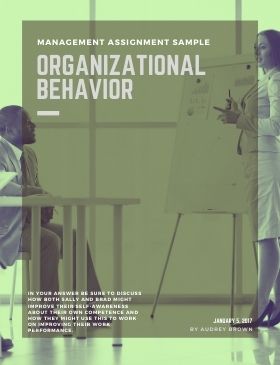
You can download the sample Quality management essay on Kluckhohn Strodtbeck and Hofstede Frameworks with the following question for free at the end of this page. For further assistance with Management Assignment help, please check our offerings in Management assignment solutions. Our subject-matter experts provide online assignment help to Management students from across the world and deliver plagiarism free solution with a free Turnitin report with every solution.
(AssignmentEssayHelp does not recommend anyone to use this sample as their own work.)
Management Assignment Question
The Scenario:
You are a human resource manager at a large Australian bank. As part of your job you are required to conduct annual performance appraisals for 20 employees at various levels in the bank, ranging from young trainees right through to experienced mid-tier managers. These performance appraisal interviews are important for the employees and the organization: they are used to determine pay levels for the next year and also form the basis for major decisions about promotion, training, etc. From next year, however, the annual performance appraisal will take on an extra significance as the bank is thinking of adopting a 'rank and yank' approach. This means that the top 20% of performers at each level across the organization will each receive a performance bonus while the bottom 20% of performers at each level across the organization will be fired. So, from next year the stakes will be very high and, as part of this year's performance appraisal you must give the employees clear and unambiguous advice about how they need to improve their performance in order to avoid being fired and perhaps even gain a bonus. Before their appraisal each employee is required to fill out a self-assessment questionnaire. The first question asks the employee, 'How would you rate your overall performance in the previous year.' They can rate themselves from 'Poor' to 'Outstanding.'
The Employees:
Brad
The first person you seen is Brad. He is a 23 year old management trainee who has just completed his first year with the bank. At his interview 18 months ago (which you conducted) Brad was confident he would graduate from the university with an H1 average, although when he actually got his results his average was nearer to an H3. Still, he had impressed at the interview with his enthusiasm and knowledge of the banking system (his father had been a senior executive at another bank) so you decided to take a punt on him and offer him one of the coveted and highly competitive management training positions. Unfortunately for you and Brad's colleagues, this decision isn't working out very well. Brad's performance has been, at best, average and he struggles with lots of things that other trainees are finding to be straightforward and he often blames others for his mistakes. Still, his enthusiasm is undiminished and he enters into each new task with great vigor (even if he usually ends
up doing a poor job). In fact, it's difficult to persuade Brad not to volunteer for jobs that he is obviously (to others at least) unsuited for.
In Brad's self-assessment, he has rated his performance over the previous year as 'Outstanding.'
Sally
The next person you see is Sally. She joined the bank as a 18 year old trainee and has slowly but surely made her way up to be a competent and reliable supervisor of a 10 person team of bank tellers. These are the 'front line' customer service operatives who deal with the public all day. It can be a stressful and demanding job but it creates few obvious opportunities for the team members to exercise their autonomy. Still, Sally's is one of the top performing teams in the bank and they report high levels of job satisfaction and morale. They all attribute this to Sally's low-key but supportive management style. Despite this, Sally is extremely modest about her own skills and achievements. She is quite shy and introverted but seems to have a knack for getting the best out of others. At 35, Sally has been in the supervisor's role for 5 years and you think she should really be thinking about applying for promotion, although it is unlikely she will ever do this without considerable prompting and support. She attributes all the team's successes to its members and never takes any credit herself.
In Sally's self-assessment, she has rated her performance over the previous year as 'Average.'
Questions:
Part A: An analysis of Brad and Sally's situation
Using the articles by Dunning and his colleagues, plus additional material you find through your own research, answer the following questions:
1. How would you explain Brad and Sally's behaviour in relation to their own performance and the performance of their colleagues? In your answer be sure to discuss the conceptual and practical implications of Dunning's ideas about competence and self-awareness in the workplace.
(approx. 350 words).
2. Bearing in mind your response to the previous question, suggest advice that you would give Sally so that she gets rated in the top 20% and receives a fair annual bonus? Conversely, what advice would you give Brad so that he can avoid being 'yanked' (i.e., being rated in the bottom 20% and fired) next year? In your answer be sure to discuss how both Sally and Brad might improve their self-awareness about their own competence and how they might use this to work on improving their work performance.
(approx. 350 words).
Part B: A personal reflection
3. Importantly, the ideas of Dunning and his colleagues appear to have universal relevance. In other words, in any situation where our performance is being rated by others, most of us tend to overestimate our competence level in the particular skill being rated. In light of this insight, reflect on how you would respond in the future if, like Brad, your success at university doesn't meet your own expectations? Be sure to take into consideration key attitudinal and behavioural factors like your response to advice and criticism, your levels of motivation, your willingness to seek help, etc. Also, be sure to draw on additional appropriate material you find through your own research.
(approx. 300 words).
Management Assignment Solution
PART A:
1. The judgement of an individual and his subsequent decisions are influenced by a cluster of cognitive, perceptual and motivational inclinations. (Pronina, 2007). Individuals are commonly excessively idealistic when assessing the nature of their execution on social and intelligent undertakings. (Ehrlinger et al, 2008, p. 99)Specifically, poor entertainers horribly overestimate their exhibitions in light of the fact that their inadequacy denies them of the aptitudes expected to perceive their shortfalls. (Ehrlinger et al, 2008, p. 110)
Brad has obviously overestimated his performance, as well as his abilities. This has happened right from the interview stage, where he managed to convince me that he would graduate with high grades, while his actual performance was much below what he thought he would achieve. Dunning et al, (2003), believe that; the aptitudes expected to deliver sensibly sound contentions, for example, are the same attitudes that are important to perceive when a sensibly sound contention has been made. Therefore, if individuals do not have the aptitudes to deliver right replies, they are additionally reviled with a failure to know when their answers. (Dunning et al, 2003)This holds especially true for Brad, where he has constantly overstated his abilities, but, failed at the time of the actual work.
Sally's case seems to be the exact opposite of Brad. She has been a consistent performer for the company, but, has repeatedly understated her own performance. Her performance in the company has been very good till far, but, she rates herself as an average employee. Dunning et al, (2003) believe that: This underestimation has an alternate source than the overestimation of poor entertainers. Top entertainers have a tendency to have a moderately great feeling of how well they perform in supreme terms, for example, their crude score on a test. Where they blunder is in their assessments of other individuals reliably overestimating how well other individuals are doing on the same test. Subsequently, they have a tendency to belittle how their execution contrasts and that of others. (Dunning et al, 2003) Hence, in the case of Sally, it appears that she tends to rate the performance of her co-workers higher than it actually is, and by that estimate she rates her own performance lower.
2. Some recent studies have proposed that individuals have a tendency to perceive (and even overestimate) the operation of inclination in human judgment – with the exception of when that predisposition is their own. For example, Kruger and Dunning. (1999) believe that: A few lines of examination are steady with the idea that people who are not competent do not have the Meta cognitive aptitudes vital for exact evaluation toward oneself. Deal with the way of skill, for example, has uncovered that fledglings have poorer meta cognitive abilities than do specialists. (Kruger & Dunning, 1999) Beside the general rationale to update toward one, two essential wellsprings of this ‘bias blind spot’ (Pronina, 2007, p. 37) have been distinguished. One includes individuals’ overwhelming weighting of thoughtful confirmation when evaluating their own particular predisposition, notwithstanding the propensity for inclination to happen unconsciously. The other includes individuals’ conviction that their discernment specifically reflect reality, and that the individuals who see things diversely are in this way one-sided. Individuals’ inclination to deny their own particular predisposition, even while perceiving inclination in others, uncovers a significant inadequacy in mindfulness, with vital results for interpersonal and conflicts within a group. (Pronina, 2007)
It is extremely important that Brad and Sally both realize their actual potential, rather than their perceived ones. For Brad, it is imperative that he be taken aside and given a verbal talk regarding his potential, and how his performance is unsatisfactory and overrated as per his measures. He must be given the example of his performance during graduation, and made aware that he is on the cusp of exiting the company if he does not get his act together. However, it is encouraging to see Brad's enthusiasm, albeit it may be misplaced. Sally too needs a verbal talk. She needs to be motivated that her performance is very good, and that the management is happy with her work. Specific examples of her work will need to be cited where she has done well. This shall add to her confidence and make her an even more productive worker.
PART B:
Analysts in the field of psychological research have explored various variables in their relationship to scholastic execution. Two variables that have been of specific enthusiasm to analysts are accomplishment objectives and Meta cognition. (Coutinho, 2007) Scholarly achievement in this exploration alludes to scholarly execution which is surveyed in the United States by Grade Point Average (GPA). (Coutinho, 2007)GPA is calculated crosswise over scholastic branches of knowledge what’s more over semesters, and accordingly gives a genuinely powerful measure of achievement in college. (Coutinho, 2007). The Grading system in Australia, is, however, based on the merit of the student. The most common grading system in Australia measures the students performance as HD (High Distinction), Distinction (D), Credit (C), Pass (P), Fail (N).
I expect to graduate with HD. However, if my grades do not reflect my expectations, I believe I will not be too disappointed. According to my own abilities, I believe I will be able to find a suitable job in the industry, and settle down. I am personally not a big believer in the grading system. Although the grades can provide a gross estimate of one's……..


 WhatsApp Us
WhatsApp Us